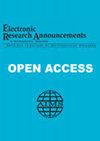$\boldsymbol{q}$-变形的Campbell-Baker-Hausdorff-Dynkin定理
Q3 Mathematics
Electronic Research Announcements in Mathematical Sciences
Pub Date : 2015-07-01
DOI:10.3934/ERA.2015.22.32
引用次数: 2
摘要
我们宣布Campbell, Baker, Hausdorff和Dynkin的著名定理的一个类比 $q$-指数型 $\exp_q(x)=\sum_{n=0}^{\infty} \frac{x^n}{[n]_q!}$,用通常的符号表示 $q$-阶乘: $[n]_q!:=[n-1]_q!\cdot(q^n-1)/(q-1)$ 和 $[0]_q!:=1$。我们的结果表明,如果 $x$ 和 $y$ 非通勤是不确定的吗 $[y,x]_q$ 是? $q$换向器 $yx-q\,xy$,则存在线性组合 $Q_{i,j}(x,y)$ 迭代的 $q$-换向器 $i$ $x$’s, $j$ $y$’s and $[y,x]_q$ 在他们的中心位置,这样 $\exp_q(x)\exp_q(y)=\exp_q\!\big(x+y+\sum_{i,j\geq 1}Q_{i,j}(x,y)\big)$。我们的扩展与Schutzenberger的著名结论是一致的 $\exp_q(x)\exp_q(y)=\exp_q(x+y)$ 当且仅当 $[y,x]_q=0$,改进了以往的部分结果 $q$-变形幂。在此基础上,我们给出了一种算法,该算法可以推测地产生最小生成集 $[y,x]_q$-中心 $q$-任意倍数的对易子 $(i,j)$,它允许我们计算所有可能的 $Q_{i,j}$.本文章由计算机程序翻译,如有差异,请以英文原文为准。
The $\boldsymbol{q}$-deformed Campbell-Baker-Hausdorff-Dynkin theorem
We announce an analogue of the celebrated theorem by Campbell, Baker, Hausdorff, and Dynkin for the $q$-exponential $\exp_q(x)=\sum_{n=0}^{\infty} \frac{x^n}{[n]_q!}$, with the usual notation for $q$-factorials: $[n]_q!:=[n-1]_q!\cdot(q^n-1)/(q-1)$ and $[0]_q!:=1$. Our result states that if $x$ and $y$ are non-commuting indeterminates and $[y,x]_q$ is the $q$-commutator $yx-q\,xy$, then there exist linear combinations $Q_{i,j}(x,y)$ of iterated $q$-commutators with exactly $i$ $x$'s, $j$ $y$'s and $[y,x]_q$ in their central position, such that $\exp_q(x)\exp_q(y)=\exp_q\!\big(x+y+\sum_{i,j\geq 1}Q_{i,j}(x,y)\big)$. Our expansion is consistent with the well-known result by Schutzenberger ensuring that one has $\exp_q(x)\exp_q(y)=\exp_q(x+y)$ if and only if $[y,x]_q=0$, and it improves former partial results on $q$-deformed exponentiation. Furthermore, we give an algorithm which produces conjecturally a minimal generating set for the relations between $[y,x]_q$-centered $q$-commutators of any bidegree $(i,j)$, and it allows us to compute all possible $Q_{i,j}$.
求助全文
通过发布文献求助,成功后即可免费获取论文全文。
去求助
来源期刊
CiteScore
0.90
自引率
0.00%
发文量
0
审稿时长
>12 weeks
期刊介绍:
Electronic Research Archive (ERA), formerly known as Electronic Research Announcements in Mathematical Sciences, rapidly publishes original and expository full-length articles of significant advances in all branches of mathematics. All articles should be designed to communicate their contents to a broad mathematical audience and must meet high standards for mathematical content and clarity. After review and acceptance, articles enter production for immediate publication.
ERA is the continuation of Electronic Research Announcements of the AMS published by the American Mathematical Society, 1995—2007

 求助内容:
求助内容: 应助结果提醒方式:
应助结果提醒方式:


